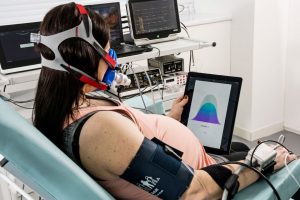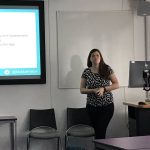Performing slow and deep breathing is frequently used to aid in relaxation, but recent research has suggested that it can also lower blood pressure. Researchers within HSS have created an App, called Brythm, that guides breathing to a lower, personalised optimal frequency.
Brythm guides breathing using visual biofeedback, via a graphic, which was created by a BU Student Research Assistant. Optimisation of breathing frequency is achieved using real time monitoring of the cardiovascular responses via a finger sensor, which plugs into the headphone socket of [almost] any smartphone or tablet.
The finger sensor uses the same technology as oxygen saturation monitors in hospitals and monitors the blood flow in your finger. Using a patent-pending algorithm, Brythm aims to maximise the cardiovascular responses to breathing.

The research team is being led by Professor Alison McConnell, a physiologist who has previously undertaken research showing the positive effects of breathing muscle strength training on exercise tolerance for athletes as well as people with cardiovascular or respiratory disease. The product she created (www.powerbreathe.com) was approved for NHS prescription in 2006, and she has similar aspirations for Brythm.
“Our new anti-hypertension App has been developed to provide people with a personalised training programme that adapts their breathing rate according to their individual physiology,” explains Professor McConnell, “It’s designed to be used for just ten minutes per day using a smartphone or tablet, which fits easily into most people’s busy lives. If Brythm training is found to be effective, it could provide a game-changing addition to the fight against hypertension, which afflicts around 30% of the UK population.”
The Brythm research team is currently carrying out research to find out more about the effects of the Brythm app for different groups of people. Professor Alison McConnell secured funding for a PhD student to work with pregnant women who have pregnancy-induced hypertension; this project started in September 2017, and is being led by Malika Felton. The team has partnered with the National Childbirth Trust, which helped to refine the Brythm and will assist in making contact with pregnant women who can help with the research.
Malika’s first study is investigating the immediate effect of using Brythm with healthy women of reproductive age, before examining these immediate effects in healthy pregnant women. The project will culminate in a study investigating both the immediate, and long-term, effects of slow and deep breathing with women who have pregnancy-induced hypertension. The hope is to be able to provide preliminary evidence of an alternative to pharmacological treatments for women who develop hypertension during pregnancy. It is hoped that this preliminary evidence might support bids for further funding to undertake a larger, randomised control clinical trial using Brythm.

As part of the process of preparing for NHS trials in people with primary hypertension, Professor McConnell was recently awarded internal funding for two pump-priming projects using Brythm. Both projects will provide the preliminary evidence of the feasibility of using the Brythm App, as well as the proof of concept evidence needed to secure external funding for larger studies.
The first pump-priming project is investigating the feasibility of using Brythm under ‘real world’ conditions. Stephanie Grigsby, a research midwife from Poole Hospital, is on secondment to the Brythm team for 1 day a week as Project Manager. Participants are being drawn from BU staff, who are asked to download Brythm onto their own device and to use it for 10-minutes daily for 8-weeks. The aim is to understand the use of the App itself, rather than its physiological effects, so there are no health-related exclusion criteria, but participants must be aged 40 or over. The results of this project will help with the design and running of future trials, providing evidence of the usability of Brythm.
The second pump-priming project that is currently underway compares the immediate effects of using Brythm with those created by a breathing biofeedback device already approved by the NHS and US Food & Drug Administration. RESPeRATE delivers the paced breathing using auditory tones and lowers breathing frequency to 6 breaths per minute. The short-term effects of the two methods will be compared, with the aim of demonstrating that Brythm is at least as good as the NHS-approved RESPeRATE device. This project is being undertaken by Dr Pedro Vargas, a co-inventor of the Brythm App, and a previous Postdoctoral Research Fellow of Bournemouth University, who is now based in his home country of Portugal. The study takes place from 29th May – 8th June.
The Brythm team is also delighted to have secured a new SRA who will assist with data collection for all current studies, as well as with data collation and analysis. They will have a fantastic opportunity to be part of the Brythm team and get involved in all aspects of the project, from testing in the HSS Cardiorespiratory Research Laboratory, to analysing the data, as well as taking part in preparing the published research papers that will follow these projects. A second SRA from the Faculty of Media and Communication, has also come on board to produce instructional videos to assist participants with using Brythm and with troubleshooting. These videos will be important tools for supporting participants in future trials, as well as for promoting the research at BU, and the videos will be an integral part of the new BU Brythm website (www.brythm.com [awaiting publication]).

If you are interested in the Brythm research and would like to try the App, the Brythm team is running a drop-in activity session at the Festival of Learning in the Fusion Building on Saturday 16th June.
There are also opportunities to participate in one of our current or future research studies, and if you are interested in this, please read on for more information.
Would you like to help test Brythm?
Brythm is currently in the testing phase and the Brythm team are recruiting for 3 separate projects investigating different aspects of the Brythm App.
Malika Felton’s study on the immediate cardiovascular effects of Brythm
Who? Healthy women of reproductive age (18-49 years).
Requirements? One 2-hour session in the Cardiorespiratory Research Laboratory in Bournemouth House, Lansdowne campus.
Feasibility of using Brythm in the ‘real world’
Who? Anyone aged 40 years or over. Must have a device capable of downloading and using the Brythm App. We can provide guidance on this on request.
Requirements? 10-minute daily breathing sessions for 8 weeks. Recorded daily blood pressure readings, using an automated monitor we provide. An initial meeting is required to demonstrate Brythm and provide the required equipment, which lasts 30 minutes.
Brythm vs. RESPeRATE
Who? Non-smokers who have no history of cardiovascular or respiratory disease.
Requirements? One 1 ½ to 2-hour session in the Cardiorespiratory Research Laboratory in Bournemouth House, Lansdowne campus.
If you would like more information on any of the projects described above, and/or to receive a participant information sheet, please contact Malika Felton at mfelton@bournemouth.ac.uk or on 01202 961845. Alternatively, drop in to her office in R305 to find out more about the Brythm project, or about participating in one of the research projects.
 Are you interested in testing an App developed at BU and designed to lower blood pressure?
Are you interested in testing an App developed at BU and designed to lower blood pressure? Café Sci Tuesday 1 March: Deep breathing to lower blood pressure
Café Sci Tuesday 1 March: Deep breathing to lower blood pressure Successful Away Day for the Centre for Midwifery, Maternal and Perinatal Health
Successful Away Day for the Centre for Midwifery, Maternal and Perinatal Health










 Nursing Research REF Impact in Nepal
Nursing Research REF Impact in Nepal Fourth INRC Symposium: From Clinical Applications to Neuro-Inspired Computation
Fourth INRC Symposium: From Clinical Applications to Neuro-Inspired Computation ESRC Festival of Social Science 2025 – Reflecting back and looking ahead to 2026
ESRC Festival of Social Science 2025 – Reflecting back and looking ahead to 2026 3C Event: Research Culture, Community & Cookies – Tuesday 13 January 10-11am
3C Event: Research Culture, Community & Cookies – Tuesday 13 January 10-11am Dr. Chloe Casey on Sky News
Dr. Chloe Casey on Sky News ECR Funding Open Call: Research Culture & Community Grant – Application Deadline Friday 12 December
ECR Funding Open Call: Research Culture & Community Grant – Application Deadline Friday 12 December MSCA Postdoctoral Fellowships 2025 Call
MSCA Postdoctoral Fellowships 2025 Call ERC Advanced Grant 2025 Webinar
ERC Advanced Grant 2025 Webinar Horizon Europe Work Programme 2025 Published
Horizon Europe Work Programme 2025 Published Update on UKRO services
Update on UKRO services European research project exploring use of ‘virtual twins’ to better manage metabolic associated fatty liver disease
European research project exploring use of ‘virtual twins’ to better manage metabolic associated fatty liver disease